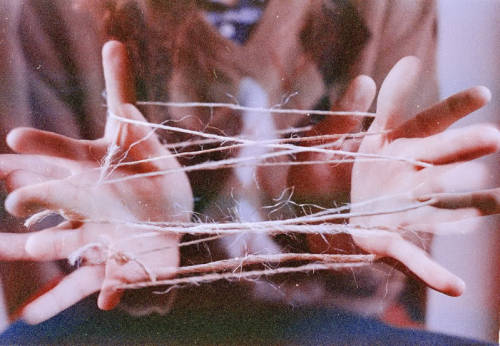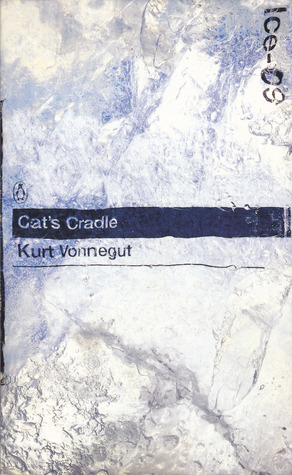The name science fiction suggests a genre of mechanical, complicated stories set in a wonderfully horrid future of absurd technology. It suggests confusion and breaks for googling quantum physics references (try "The String Theory"). What it doesn't imply is a hard-hitting, and ironic, commentary of human nature.
Kurt Vonnegut is one of those men whose futuristic science-y crap is actually a testimony to what's really interesting - people and their interesting interesting lives.
Cat's Cradle - Kurt Vonnegut
Told with deadpan humour & bitter irony, Kurt Vonnegut's cult tale of global destruction preys on our deepest fears of witnessing Armageddon &, worse still, surviving it ...
Dr Felix Hoenikker, one of the founding 'fathers' of the atomic bomb, has left a deadly legacy to the world. For he's the inventor of 'ice-nine', a lethal chemical capable of freezing the entire planet.
And it ties into the mood of uncertainty of the book. "We've been lied to!" is what the title screams, and this is explicitly laid out when one of the characters (a midget character - just to give you a visual, and to display the absolute randomness of this book) joins in,
Kurt Vonnegut is one of those men whose futuristic science-y crap is actually a testimony to what's really interesting - people and their interesting interesting lives.
Cat's Cradle - Kurt Vonnegut
Told with deadpan humour & bitter irony, Kurt Vonnegut's cult tale of global destruction preys on our deepest fears of witnessing Armageddon &, worse still, surviving it ...
Dr Felix Hoenikker, one of the founding 'fathers' of the atomic bomb, has left a deadly legacy to the world. For he's the inventor of 'ice-nine', a lethal chemical capable of freezing the entire planet.
The search for its whereabouts leads to Hoenikker's three ecentric children, to a crazed dictator in the Caribbean, to madness. Felix Hoenikker's Death Wish comes true when his last, fatal gift to humankind brings about the end, that for all of us, is nigh..
A fake religion. A banana republic. The end of the world. A beautiful girl.
That's all there is to this book really.
Riding on the wave of the typical Cold War fear of an instantanteous end to this world, this 1963 novel is just so perfect for its time.
Tiny chapters (just one or two pages long) are woven together by the wise, insightful words of a fake religion. These flickering episodes were precisely like seemingly unconnected flashes of memory - the true memoir of a wandering mind.
The science really only played a minor role (while single-handedly progressing the entire plot) with the idea of the atomic bomb popping up as often as I imagine it must have popped up in the 60s. Ultimately, it is one man's heartless science that lead to the much-feared (and much-celebrated) end of the world.
I really don't know what to say, I enjoyed the irony, the dark humor, and almost felt myself transported back to the unrest of the 60s with a mindset of uncertainty, and fear - a coarse humor of a grim kind.
The title Cat's Cradle comes from the string game we all played as kids - a tangle of fingers and thin threads to make coherent shapes. (Here's a picture because I'm a terrible explainer:)
 |
| From: phlorenz.livejournal.com |
No wonder kids grow up crazy. A cat's cradle is nothing but a bunch of X's between somebody's hands, and little kids look and look and look at all those X's….[And] No damn cat, and no damn cradle.
So if you ever wonder what it was like in the 50s, pick up this book before you go reading dreary journalistic articles about "Teenage Delinquency," and "Life After the War." It'll give you an accurate representation of an entire era - not bad for a science fiction book. Not bad at all.

No comments:
Post a Comment